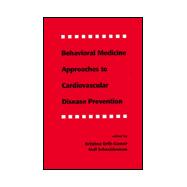
Note: Supplemental materials are not guaranteed with Rental or Used book purchases.
Purchase Benefits
Looking to rent a book? Rent Behavioral Medicine Approaches to Cardiovascular Disease Prevention [ISBN: 9780805818208] for the semester, quarter, and short term or search our site for other textbooks by Orth-Gomér, Kristina; Schneiderman, Neil; Orth-Gomer, Kristina. Renting a textbook can save you up to 90% from the cost of buying.
| Acknowledgments | ix | ||||
| PART I: INTRODUCTION TO CARDIOVASCULAR DISEASE PREVENTION AND BEHAVIORAL MEDICINE | |||||
|
3 | (8) | |||
|
|||||
|
11 | (10) | |||
|
|||||
| PART II: BEHAVIORAL EPIDEMIOLOGY AND PUBLIC HEALTH IN CARDIOVASCULAR DISEASE PREVENTION | |||||
|
21 | (22) | |||
|
|||||
|
|||||
|
43 | (8) | |||
|
|||||
|
51 | (18) | |||
|
|||||
|
|||||
|
69 | (18) | |||
|
|||||
|
87 | (18) | |||
|
|||||
| PART III: BIOBEHAVIORAL AND PSYCHOSOCIAL FACTORS IN CARDIOVASCULAR DISEASE PREVENTION | |||||
|
105 | (30) | |||
|
|||||
|
|||||
|
135 | (14) | |||
|
|||||
|
149 | (12) | |||
|
|||||
|
161 | (8) | |||
|
|||||
|
169 | (16) | |||
|
|||||
| PART IV: BEHAVIORAL INTERVENTION MODELS IN CARDIOVASCULAR DIEASE PREVENTION | |||||
|
185 | (18) | |||
|
|||||
|
|||||
|
|||||
|
|||||
|
203 | (24) | |||
|
|||||
|
|||||
|
|||||
|
|||||
|
227 | (10) | |||
|
|||||
|
237 | (26) | |||
|
|||||
|
263 | (16) | |||
|
|||||
| PART V: SUMMARY AND CONCLUSIONS | |||||
|
279 | (22) | |||
|
|||||
|
|||||
| Author Index | 301 | (14) | |||
| Subject Index | 315 |
The New copy of this book will include any supplemental materials advertised. Please check the title of the book to determine if it should include any access cards, study guides, lab manuals, CDs, etc.
The Used, Rental and eBook copies of this book are not guaranteed to include any supplemental materials. Typically, only the book itself is included. This is true even if the title states it includes any access cards, study guides, lab manuals, CDs, etc.